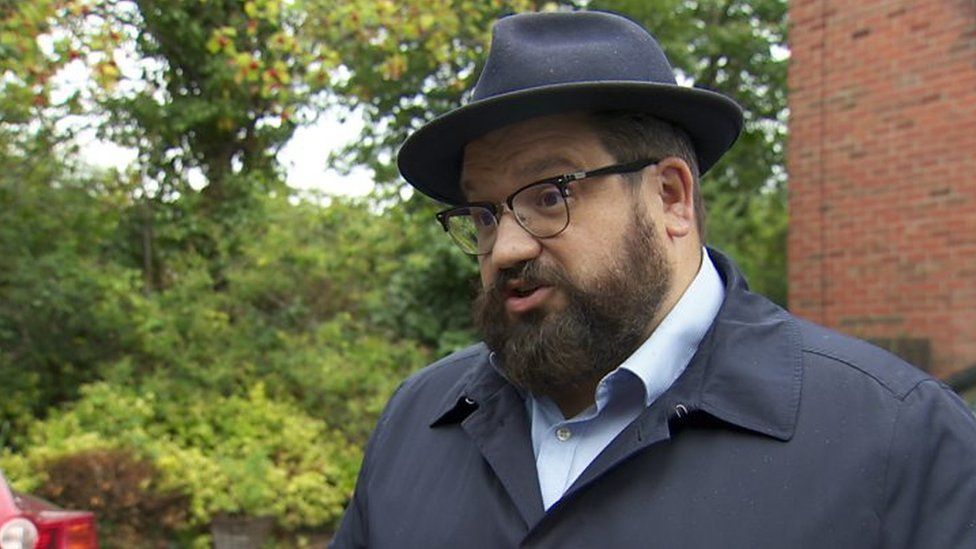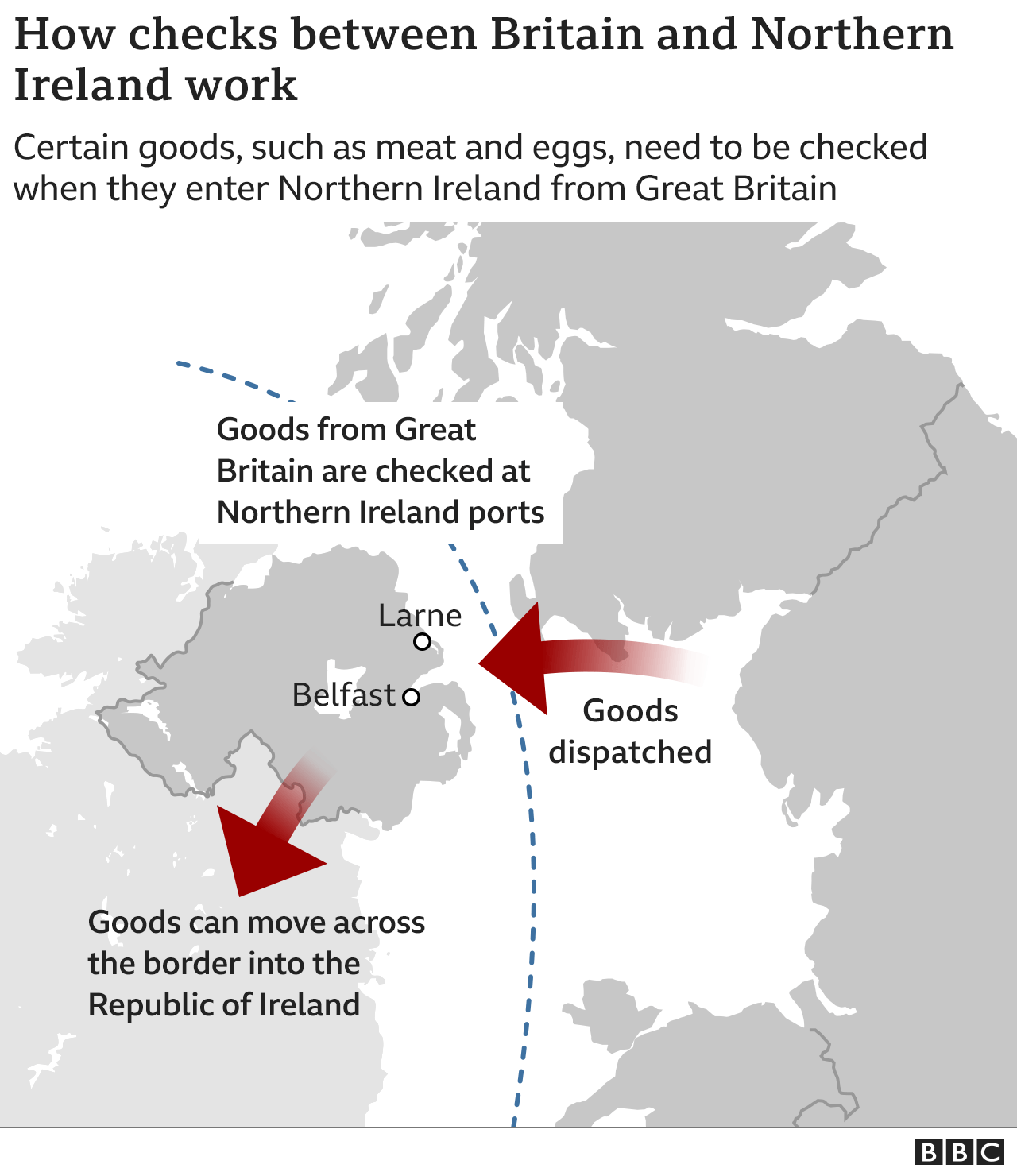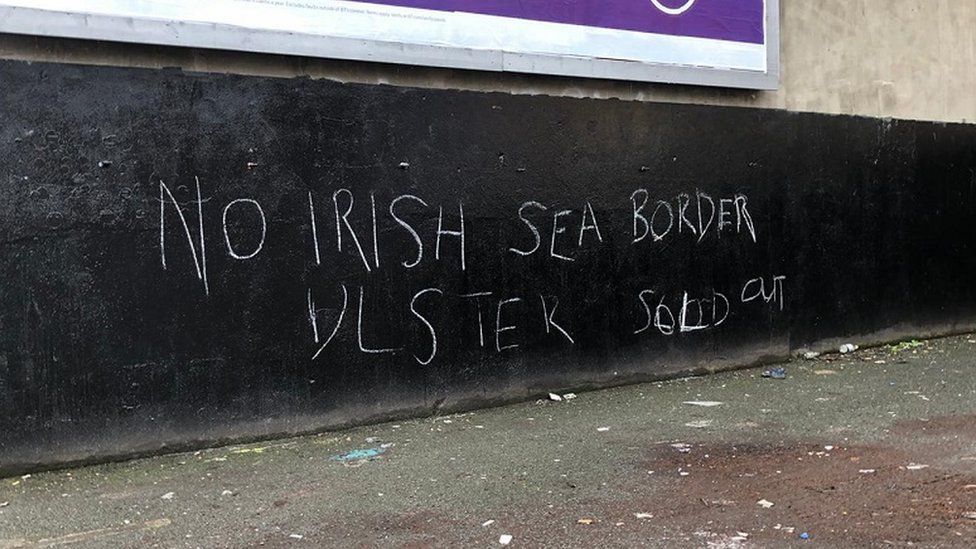The UK and EU remain at odds on the way forward for the Northern Ireland Protocol but some decisions will have to be made soon, with some significant grace periods set to end in a month’s time.
Northern Ireland’s Economy Minister Gordon Lyons on Tuesday called for further delays to Irish Sea border checks.
Mr Lyons said there would be “real problems” if grace periods expire as planned on 1 October.
So what comes next?
What is the protocol?
It is the deal agreed by the UK and EU to prevent a hard border between Northern Ireland and the Republic of Ireland after Brexit.
It does this by keeping Northern Ireland in the EU’s single market for goods.
This means goods don’t have to checked as they cross the Irish border, instead some checks and controls are required on goods entering Northern Ireland from the rest of the UK.
This has caused difficulties for some businesses and is opposed by unionist parties in Northern Ireland, which say it undermines Northern Ireland’s constitutional position as part of the UK.
In July the UK published a “command paper” proposing radical changes to the protocol but the EU says it will not renegotiate.
What has to happen now?
The protocol has not been fully implemented due to what are know as “grace periods”.
These are delays to some of the new checks and controls to give businesses more time to adapt and prepare.
Some significant grace periods are due to expire on 1 October.
At that point some Great Britain-made meat products would be prohibited in Northern Ireland – what has become known as “the sausage ban”.

A much bigger concern for supermarkets is they would need to start using export health certification for all products of animal origin (meat, dairy, fish and eggs) going from Great Britain to Northern Ireland.
This would be a significant increase in administration and complexity.
The economy minister said Northern Ireland would not be able to cope with the additional administrative burden.
“There will be real problems for our supplies particularly in terms of food,” he added.
Aodhán Connolly from the Northern Ireland Retail Consortium said the conditions were not in place to end the grace period.
“It was put in place to allow a new system to come in that would remove friction from moving goods [from] Great Britain to Northern Ireland,” he told BBC News NI.
“That isn’t in place and so we need a standstill.
“Otherwise there will be new certification required that will need signed off by a vet.
“That means friction, which means costs that neither retailers nor Northern Ireland householders can afford.”

What are the options for extending grace periods?
Grace periods have been extended twice before but in radically different circumstances.
In March the UK unilaterally extended some grace periods.
It delayed the introduction of new checks on food, parcels and pets.
It also moved unilaterally to ease the trade in horticultural products across from Great Britain to Northern Ireland.
That met with a furious response from the EU, which said that by acting alone the UK was in clear breach of the protocol.
The European Commission began a legal action against the UK, which is still continuing.
However, in June the UK formally requested an extension to the sausages grace period which was granted by the EU.
The EU said it was being “accommodating’ and the UK described the move as “sensible”.
So the nature of any extension will set the tone for UK-EU relations in the months ahead: conflict or conciliation.
Mr Lyons’ party, the DUP, wants the Protocol to be entirely scrapped but he said extension of the grace periods are needed as “an absolute minimum”.

Will the EU definitely agree to an extension if asked?
The UK has not yet made a formal request for a further extension, but in its July proposals it said a “standstill” period was needed, including the continuation of existing grace periods.
At that time a European Commission spokesperson said: “With regards to the request for a standstill, the commission will carefully assess the new proposals made by the UK, in accordance with the necessary consultation procedures, both internally and with the European Parliament.”
Officials from the UK and EU have remained in contact over the summer and grace periods have featured in discussions.
A UK government spokesperson said: “There has been ongoing technical contact over the summer with the commission regarding the proposals we set out in the command paper.
“We set out in July the importance of providing certainty for businesses and citizens through “standstill” arrangements as those discussions proceed, and welcomed the EU’s decision at the end of July not to proceed to the next stage of its legal proceedings.
‘We will update traders in due course as to any developments in this regard.”
Sam Lowe, from the Centre for European Reform, said the EU would not be happy at the prospect of further extensions but would not be surprised.
“The question is whether the grace period extensions can be agreed together, as part of a joint exercise designed to work through the issues surrounding the implementation of the protocol, or whether the UK extends them unilaterally,” he said.
“Either way, it’s difficult to see them falling away any time soon.”
Source: BBC

